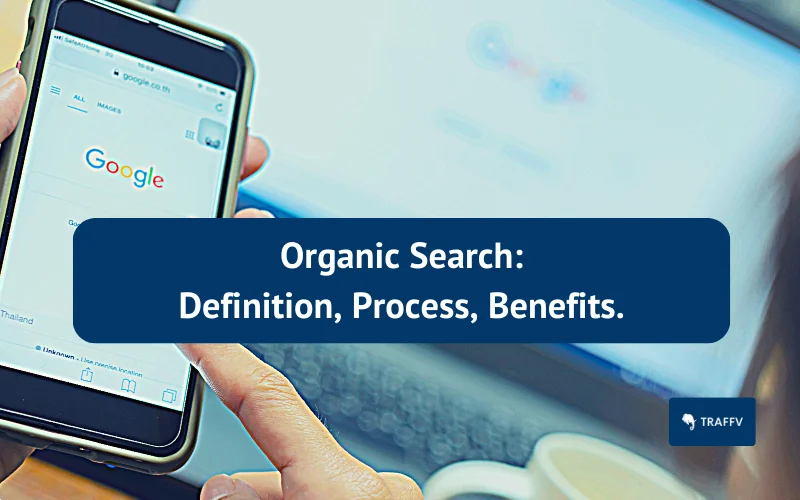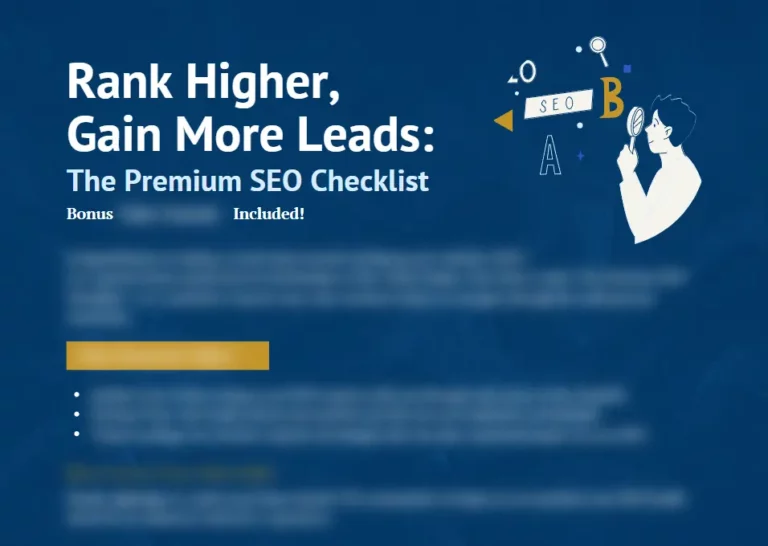The digital landscape is vast and ever-changing, with organic search standing as a beacon guiding users to the relevant answers they seek.
It’s not just about getting your website on the first page of search engine results, but about ensuring the right people find you at the right time.
So, how does one navigate this terrain and harness the power of organic search?
Let’s embark on this journey together and unlock the mysteries of organic search.
TL:DR
- Organic search is an effective way to gain long-term visibility, cost-effectiveness, higher conversion rates and increased brand credibility.
- Key strategies for boosting organic search presence include mastering keyword research, technical SEO optimization and content creation/optimization.
What is Organic Search?
Organic search results are those listings that appear on a search engine results page (SERP) without being paid for.
This is determined by relevance to the user’s search query, SEO efforts and domain authority.
In the world of organic search, relevance, discoverability, and authority are the three musketeers that guide the way to higher organic search ranking on SERPs, increased organic search traffic, and ultimately, the coveted first page.
Why is Organic Search Important?
Organic search isn’t just about garnering clicks and traffic.
It’s about creating a meaningful and lasting connection with your audience.
It’s about ensuring that when consumers turn to Google with their questions and needs, your brand is there to offer solutions and value.
Let’s delve deeper, shall we?
Long-term Visibility
In the grand scheme of digital marketing, organic search is a marathon, not a sprint.
It’s a long-term strategy that, once established, can maintain organic search rankings on page one for extended periods with only minor adjustments.
What does this mean for businesses?
Simply put, it offers a sustainable online presence, akin to a lighthouse in the vast digital ocean, guiding users to your brand over and over again.
But the benefits don’t stop at visibility.
Organic search also brings cost savings, perceived editorial accuracy, a competitive edge, increased web traffic, improved customer loyalty and retention, and the establishment of trust and credibility.
In essence, a well-executed organic search strategy not only attracts the right web visitors, but also keeps them coming back for more.
Cost-effectiveness
Let’s talk numbers.
Unlike paid search, organic search doesn’t burn a hole in your pocket.
Though it requires an upfront investment, it is generally deemed cost-effective in the long run as it is free and can generate high-quality traffic to a website.
But don’t just take our word for it.
Consider the variables at play – industry, competition, content quality.
All these factors can affect the cost-effectiveness of organic search.
For instance, small businesses with tight budgets may find organic search a more viable option compared to costly paid search campaigns.
Moreover, businesses with a strong content strategy can generate more organic traffic without investing in ads, making organic search a cost-effective option.
Higher Conversion Rates
If you’re looking to convert your web traffic into customers, organic search might just be your secret weapon.
Organic search results tend to have a higher click-through rate and generate quality leads, which can potentially lead to increased conversion rates.
It’s like having a highly persuasive salesperson who doesn’t just attract potential customers, but also convinces them to make a purchase.
So, what makes organic search so persuasive?
Users are motivated to navigate and click on the organic listings due to the assurance that the content will contain the desired information.
Organic search results have a much higher click-through rate (CTR) than paid search.
In fact, the CTR of organic searches is nearly ten times that of paid searches.
So, if you’re aiming for higher conversions, organic search is the way to go.
Increased Brand Credibility
In the digital world, credibility is currency, and organic search can help you earn it.
By amplifying brand awareness and demonstrating thought leadership, organic search can boost brand credibility, like a shining badge of honor showcasing your expertise and reliability.
Imagine your brand consistently appearing in search engine results, addressing the target audience’s needs and providing valuable content.
This not only increases visibility but also solidifies your brand’s image in the minds of the consumers.
Moreover, by providing content that is relevant to the target audience, you can facilitate the development of trust and authority in the eyes of potential customers.
This way, organic search serves as a platform to enhance your brand’s credibility and establish thought leadership.
Organic vs. Paid Search
Organic search and paid search – two sides of the same coin, yet vastly different.
The primary contrast between the two?
Paid search requires payment for ads to show up, whereas organic search does not.
It’s like the difference between renting a house (paid search) and owning one (organic search).
The former provides immediate results but at a cost, while the latter requires an investment of time and effort but promises long-term SEO benefits.
In the world of digital marketing, understanding the nuances of paid and organic search is crucial for success, as well as knowing how to navigate paid search results effectively.
In terms of longevity, organic search is enduring and will remain a source of website traffic even after the ads are terminated, whereas paid search will cease to generate traffic once the ads are no longer active.
Furthermore, users generally perceive organic search as more credible and trustworthy, while paid search is seen as more promotional and sales-oriented.
By understanding the differences between organic and paid search, businesses can make informed decisions on their marketing strategies.
So, while both have their strengths, when it comes to cost, sustainability, and user perception, organic search takes the cake.
Boosting Your Organic Search Presence: Key Strategies
Navigating the world of organic search may seem daunting, but fear not!
With the right strategies in place, you can boost your organic search presence and make your mark in the digital landscape.
Let’s delve into these strategies, shall we?
Mastering Keyword Research
The world of organic search revolves around keywords. They’re like breadcrumbs leading users to your website.
Effective keyword research helps to identify pertinent search terms and relevant keywords that resonate with your target audience, thereby driving organic traffic through the user’s search query.
So, how do you master keyword research?
Tools like Ubersuggest can help you explore topics, view estimated search volume, and find related topic ideas.
Techniques such as avoiding keyword stuffing and focusing on the relevance of the keyword can also aid in your quest for keyword mastery.
After all, failure to conduct proper keyword research could lead to a misallocation of resources without any return.
Technical SEO Optimization
While keywords are the breadcrumbs, technical SEO is the map guiding search engines to crawl and index your website.
It’s about enhancing user experience, improving mobile-friendliness, and ensuring security.
In essence, technical SEO optimization is about making your website more accessible and appealing, not just to users but also to search engines.
So, how does one optimize technical SEO?
It involves employing keyword research, creating and optimizing content, and monitoring and measuring organic search performance.
By doing so, you can improve your website’s seo, resulting in increased visitors and higher conversion rates.
Content Creation and Optimization
Content is the heart of organic search.
It’s what attracts users to your website and keeps them engaged.
Content creation and optimization involve producing valuable, engaging, and well-structured content that appeals to both users and search engines.
But creating content isn’t enough.
It needs to be optimized for search engines.
This involves consistency and investment in the development of your brand.
With the right content strategy, you can generate more clicks, enhance your brand’s sales and revenues, and establish a digital flywheel on Google.
Monitoring and Measuring Organic Search Performance
The world of organic search is dynamic, and staying abreast of your performance is crucial.
Monitoring and measuring your organic search performance helps assess the efficacy of your strategies and recognize when adjustments are necessary.
So, what should you be tracking?
Keyword rankings, market share, and organic traffic are key metrics to assess your organic search performance.
SEO softwares can be a handy tool in this endeavor, helping you monitor these metrics and make data-driven decisions.
Remember, organic search optimization isn’t a one-time task, but a continuous process that requires regular monitoring and tweaking.
Navigating SERP Features
In the ever-evolving landscape of organic search engine results pages, SERP features are the new frontier.
These are additional elements that enhance the search experience, like “People Also Ask”, “Featured Snippets”, and “Text Ads”.
Think of them as billboards on the digital highway, capturing users’ attention and improving your visibility.
So, how do you utilize these features?
It involves conducting keyword research, ensuring your content is clear and addresses the searcher’s query, implementing structured data, and submitting the sitemap to Google.
Utilizing SERP features not only facilitates users in locating pertinent results quickly, but also assists Google in delivering the most relevant results.
In essence, SERP features can be a powerful tool to improve your organic search visibility and click-through rates.
The Future of Organic Search
As we forge ahead, the landscape of organic search will continue to evolve.
Trends like mobile-first indexing, voice search, video content, and personalized SEO are expected to shape the future of organic search.
To stay updated on these trends, consider following resources like Search Engine Journal.
What does this mean for businesses?
Quick and easy access to information is becoming increasingly important.
With the rise of mobile devices and the popularity of voice search, optimizing for these trends will be key to staying relevant and competitive in the future.
As the saying goes, “The future belongs to those who prepare for it today.”
Organic Search for Sustainable Brand Growth
Remember that organic search isn’t just a tactic; it’s a long-term strategy that, when done right, can elevate your brand, connect you with your target audience, and drive sustainable growth.
Partnering with an SEO company can provide a comprehensive team and resources at a more economical rate than it would take to sustain an internal team.
Plus, they can help safeguard your brand from negative publicity, rivalry, and common SEO misconceptions.
So, are you ready to harness the power of organic search?
Frequently Asked Questions
What is meant by organic search?
Organic search results are the unpaid listings that appear on a search engine results page based on factors like relevance to the user’s query, incoming links, valid SEO efforts and domain authority.
These factors are important for businesses to consider when optimizing their website for organic search engine rankings.
What is paid search and organic search?
Paid search is a method where advertisers pay to serve ads, while organic search focuses on unpaid rankings in search results achieved through optimizing a site’s visibility.
What is the significance of organic search?
Organic search is vital, as it offers long-term visibility, cost-efficiency, higher conversion rates and increased brand credibility in comparison to paid search results.




